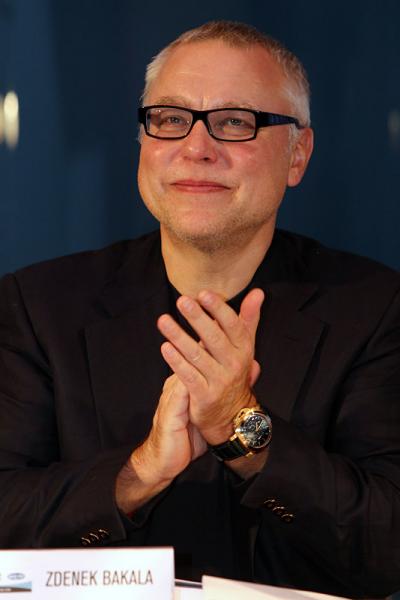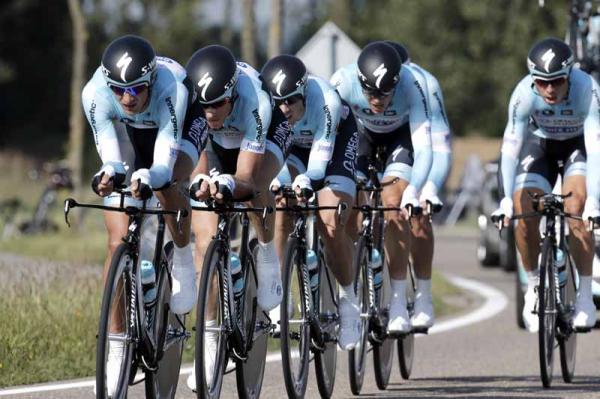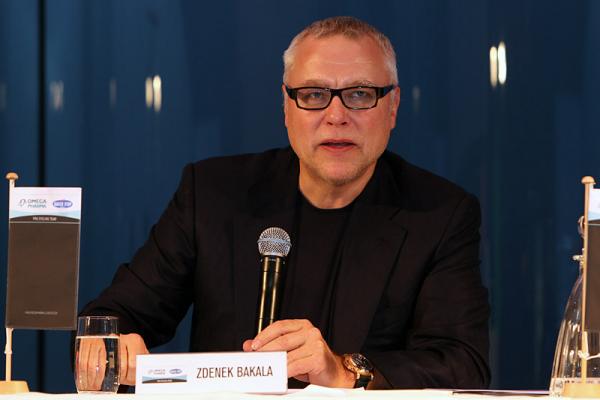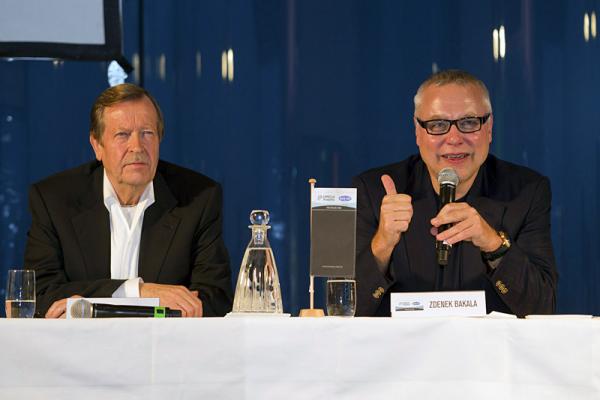Omega Pharma-QuickStep team owners propose major reform for cycling
“Champions League” plan with preliminary weaknesses




Omega Pharma-QuickStep owner Zdenek Bakala and his business partner Bessel Kok have announced plans to completely reform the professional sport of cycling.
According to the pair they have the backing of the UCI and a share of the current WorldTour teams to set up a company charged with the professionalisation of the sport, with a new race series, a more transparent anti-doping campaign, television revenue sharing, and a new ranking and points system all featuring. Bakala will be the company's first major investor, with between 10 - 20 million Euros provided for the company's inception and according to Bakala, who Forbes rate has a personal fortune of $1.9 billion, cycling's new leadership will be formed with the teams, the UCI and its investors at the centre of power.
At a press conference in Brussels on Friday, Bakala and Kok put forward the scope of the plans but admitted that they had made no contact as yet with the sport's biggest race organisers, ASO, and RCS Sport, who organise the Tour de France and Giro d'Italia.
Just under a year ago in Antwerp, Bakala first made overtures in relation to cycling's future. He was careful not to pick a favourite when quizzed about the merits and pitfalls of the two leading breakaway leagues at the time but publicly stated a desire to revolutionise the sport with varying degrees of cooperation and leadership from the UCI. Instead Bakala moderated a middle line, advocating a policy of inclusion.
In Brussels on Friday that sentiment remained and appeared the cornerstone of his 'champions league' of cycling. The inclusion of the UCI, the teams and his own private capital, set to start at between 10 and 20 million Euro are early foundations. The fact that major race organisers ASO and RCS have yet to be approached is telling though. In the doomed venture of the UCI ProTour the governing body alienated the two biggest race organisers, effectively neutering their own project. Bakala, while playing down his limited historical knowledge of the sport ,will not want to make the same mistake.
The policy of aligning the teams and the UCI and arming them with his funds is solid but it also runs the risk of scaring race organisers and most importantly the ASO and their crown jewel of the Tour de France.
"There are certain things that needs to be done in professional cycling in order for it to fulfil the potential it has for the future," Bakala began with.
Get The Leadout Newsletter
The latest race content, interviews, features, reviews and expert buying guides, direct to your inbox!
"As you know we are living in cataclysmic times when it comes to cycling. The system, the sport has been based in the recent history has been exposed as a tainted one. The Armstrong case was in a way the last drop in the bucket of how the sport is viewed, not only by the general public but also by the sponsors. The UCI as you know is under enormous pressure to reform the ways it goes about regulating the sport and managing the sport in the future. They are under pressure to replace some well know personalities at the head of the sport. Rabobank has thrown in the towel when it comes to professional cycling and that is a sponsor that has been active for 17 years, if I'm not mistaken. Last but not least the recent events have dramatically impacted the riders lives as well. There have been suspensions and there will be a number of further departures of well-known individuals due to the events that we have witnessed."
The Czech financier and his business partner Kok have identified three areas of concern that Project Champions League will look to address. The formation of the new company will focus on the fight against doping, the financial stability of the sport and governance and rules surrounding the WorldTour, rankings and points system: a holy trinity that has dogged the UCI.
Bakala's project differs from that of Gifted's Breakaway League, which was touted around in 2011, and incorporated Rothschild's millions. The Czech businessman's plans have accelerated in recent months, partly through an opportunism born from the weak state of the authorities within the sport.
"In general terms the sport is facing these challenges and it's an opportunity that has come around at this time that gives the various stakeholders and actors in the sport the ability to propose changes and to reform the way in which the sport has been run to avoid the issues we've had from the past and that have been revealed through the Armstrong case and also it's more important to make the sport that's more attractive to the consumer, that's better organised and is clear in the way that it presents itself," Bakala added.
Anti-doping
Returning to the trio of issues - anti-doping, governance and revenue - Bakala tackles the most pertinent first. Currently the UCI run the fight against doping. It has led to a number of perceived conflicts of interests but Bakala would like to see anti-doping work removed from the UCI's spectrum with an external and independent body controlling testing. The Biological Passport, the intelligence tool that was developed by the UCI, was moved out-house last year. Although Bakala is vague over which agency should run the anti-doping efforts, he says, "the doping policy has been pursued by various entities that are charged with regulating doping in sport and have been effective to some extent and ineffective in a number of other aspects. The sport is one that is probably tested more than any other, and definitely compared to other endurance spots it's one that is at the forefront of development in terms of anti-doping polices."
Bakala would also like to see a reduction in the time it takes for doping cases to be reviewed and points to the Contador case as an example. However without knowing which agency would best run the anti-doping fight and with no negotiations with WADA, part of Bakala's argument appears utopian.
The health and wealth of the teams
Bakala's hope to reform the team environment stems from the 'hand-to-mouth' existence that currently exists, whereby sponsors can withdraw from the sport, leaving riders and teams in vulnerable positions. Picking up on a measure that the Gifted group pioneered, Bakala would introduce long term licences for teams, almost following a franchise model with revenue streams opening up through television and race hosting fees.
"Teams never know where the funding of the next season was coming from. They have no ability to help create revenue streams and participate in revenue streams associated with various races. What we need in the future is a sport where teams have clear avenues to funding. The avenues to funding are transparent and above all stable so the teams can plan with a medium or long term horizon on mind. They can establish long term stability and they are not dependent on the next decision of the sponsor all the time."
The Champions League
Bessel Kok, who helped reform the world of professional chess by bringing in a more professional outlook to the game's organisational structure, would like to see cycling follow in the footsteps of UEFA's Champions League or FIA's Formula 1. Although the details were hazy, he and Bakala would appear to want a more defined race calendar of elite races, with teams providing their best riders in return for a slice of the revenue streams.
"The only way to reform the sport is to bring three constituencies together: the UCI, the teams and investors. and bring them into a global organisation, a kind of champions leave organisation of professional cycling," he said.
He and Bakala would also reform the UCI WorldTour, hoping to phase out the currently unpopular points structure that has had detrimentally negative effects on riders and teams.
Conflict of interest?
But can an investor such as Bakala hold a position of power with the governance of the sport while also juggling the responsibility of a team? Bernie Ecclestone doesn't run Ferrari and Michel Platini doesn't have shares in Chelsea or Real Madrid, leading to the question over whether Bakala could end up running cycling. Both he and Kok are looking to phase in their initiatives through the next three years, with a goal of having their platform operational and up to complete speed by 2016. After nine months of negotiations with the UCI, Bakala is adamant that he holds their blessing, while the teams have always shown an interest in profit and stability. The question of a conflict of interest is only dwarfed by situation with ASO and RCS Sport, especially the former. Kok admitted that he and Bakala have yet to meet ASO but added that he realised that any plan to reform the sport should include the world's biggest races.
Who controls the new organisation also appears unclear.
When asked about the situation Bakala said: "If your question relates to the measure of control that shareholders have over the company, that's to be determined. We don't know the exact percentages and what they'll be and secondly the overriding objective that's been adopted is that we should strive for the professionalisation of how the sport is managed. we want to eliminate the political influence from within the company and make sure that it's run as a proper business."
"We love the sport. We invested in the sport more than two years ago and we're very happy with the results of our investment and we're very happy with the progress of the team."
Daniel Benson was the Editor in Chief at Cyclingnews.com between 2008 and 2022. Based in the UK, he joined the Cyclingnews team in 2008 as the site's first UK-based Managing Editor. In that time, he reported on over a dozen editions of the Tour de France, several World Championships, the Tour Down Under, Spring Classics, and the London 2012 Olympic Games. With the help of the excellent editorial team, he ran the coverage on Cyclingnews and has interviewed leading figures in the sport including UCI Presidents and Tour de France winners.
